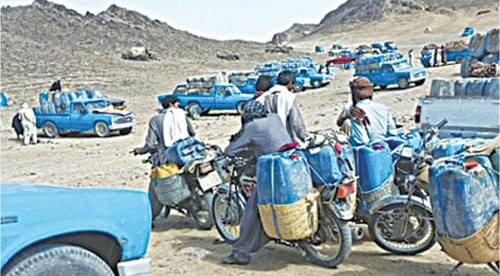KARACHI: Amid hue and cry over influx of smuggled Iranian oil, the oil marketing companies (OMCs) continued to add new retail outlets across the country, while many CNG retail outlets are being closed and converted into fuel stations.
Pakistan State Oil (PSO) has developed 37 new retail outlets during 9MFY24, taking its total nationwide footprint to 3,555.
The company completed the construction of seven storage tanks in 9MFY24.
PSO, while highlighting its circular debt position, trends in crude oil prices, the country’s stock market rebound, global GDP growth, inflation indicators and large-scale manufacturing in its 9MFY24 results, did not speak a word over the rising smuggling of fuel products from Iran.
Smuggling has affected sales of diesel and other fuel products, according to other refiners and OMCs.
Ministry says an SECP-registered firm has suggested setting up of ‘mobile units’ for fuel distribution
Attock Petroleum Ltd (APL), in its 9MFY24 report, says it strategically targeted and invested in key locations, capturing a significant share of available service areas.
In addition to the recently commissioned Dandiwal service areas and Khanewal service areas on motorways, five additional service areas on M-4 and M-14 are expected to commence operations in the final quarter of 2023-24.
These hubs provide fueling stations and essential amenities, including restrooms, a food court, and prayer area.
At a prime location in the capital, APL’s flagship outlet on Jinnah Avenue, Islamabad, is nearing completion and is expected to start operating soon.
“As part of our network refinement strategy, three under-performing retail outlets have been phased out, while 36 new outlets were successfully commissioned during the review period,” the APL report said.
The total number of retail outlets was 787 on March 31 this year while hundreds are at NOC stage or are under construction, according to the company.
Threat to oil industry
Shell Pakistan Limited (SPL) drew attention to the influx of 4,000 tonnes of smuggled fuel daily into the country, a fact confirmed by the Oil and Gas Regulatory Authority (OGRA). It poses a severe threat to the oil industry and jeopardises the stability of government revenue streams by approximately $35.6 million per month.
The SPL has over 500 stations across Pakistan and commissioned five new sites in Q1 2024, followed by refreshed 13 sites, including three Knock Down Rebuilds (KDR).
As per the website of Gas and Oil Pakistan Limited (GO), the total number of its retail outlets across the country has gone up to 1,200, from 1,000 in 2022.
Aramco has recently completed the acquisition of a 40pc equity stake in GO.
The website of BE Energy says 406 retail outlets have been constructed in the four provinces over the last 12 years while 10 sites are under construction.
The company obtained oil marketing licence in 2005 and developed 40 outlets in in 2006.
Abdul Sami Khan, who heads the Pakistan Petroleum Dealers Association (PPDA), said “I am a bit unsatisfied with the way new pumps are being opened and even on CNG stations which have been closed. OGRA is giving permission for opening of new pumps.”
Mobile units
The ministry of energy (petroleum division), in the third week of last month, informed the oil and gas sector stakeholders that an SECP-registered company has sought permission for distribution/marketing of fuels/gas through “mobile units.”
The company had presented a plan to introduce doorstep fuel delivery for registered customers by using state of the art safety standards, in coordination with leading OMCs as their marketing companies and distribution are through bulk procurement.
Keeping in view safety hazards, OGRA and Department of Explosives have observed that the proposal can be considered with a limited scope to diesel supply only to facilitate consumer business operations for supply in agricultural areas and far-flung places.
Sami Khan condemned the approval of a proposal about mobile dispensing units, informing the Ministry of Energy that safety is a major concern as a minor lapse could “lead to a catastrophe”.
Another concern, he added, relates to pricing as mobile units can sell the products at lower prices compared to the retailers’ fixed price mechanism.
This may create marketing issues as it offers cheaper prices to B2B customers’ right in front of the retail outlets.
“With more than 10,000 pumps in the country, introduction of mobile units will affect sales volumes at pumps and act as a cannibalisation of our business,” Sami Khan said.
Published in Dawn, June 2nd, 2024













































